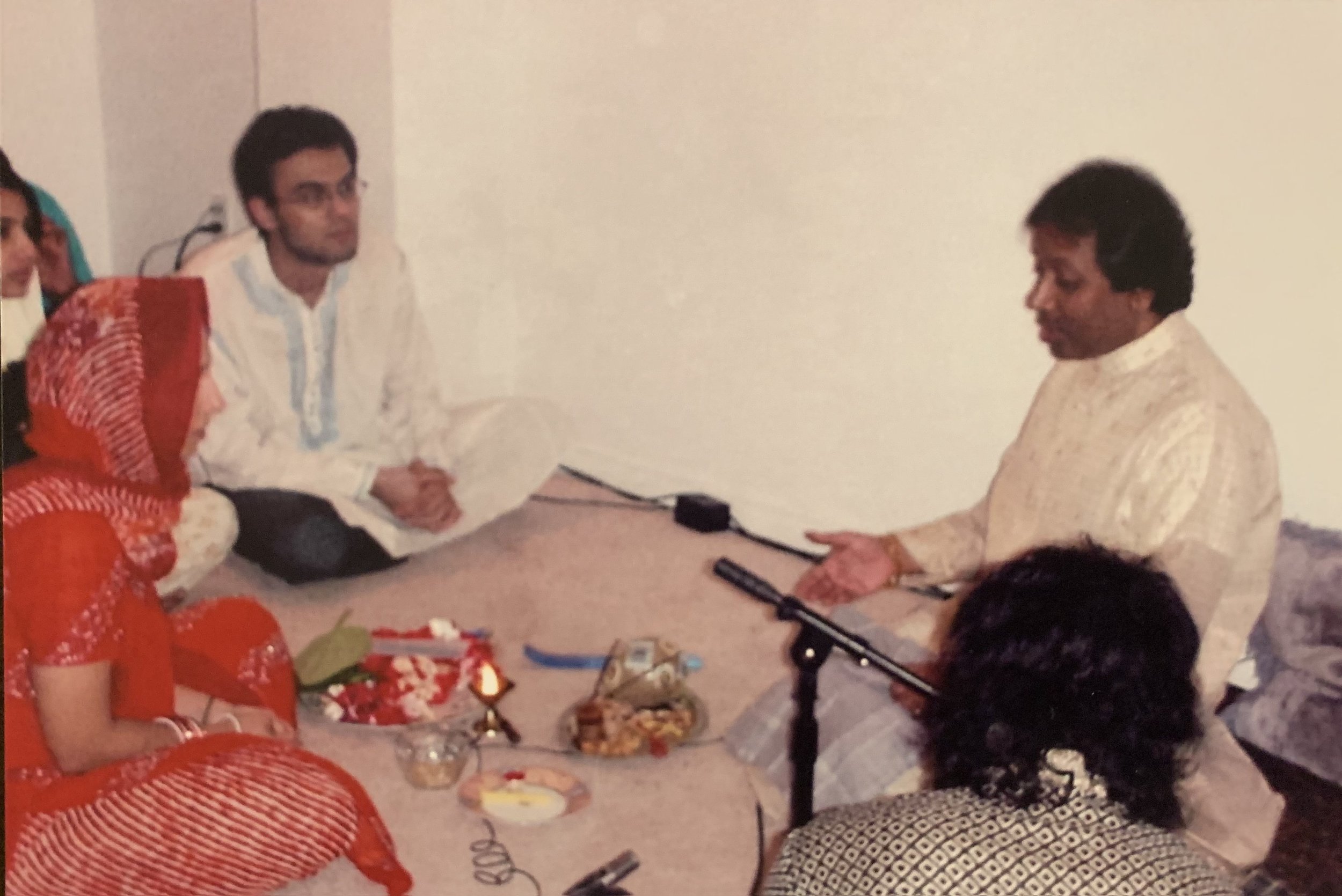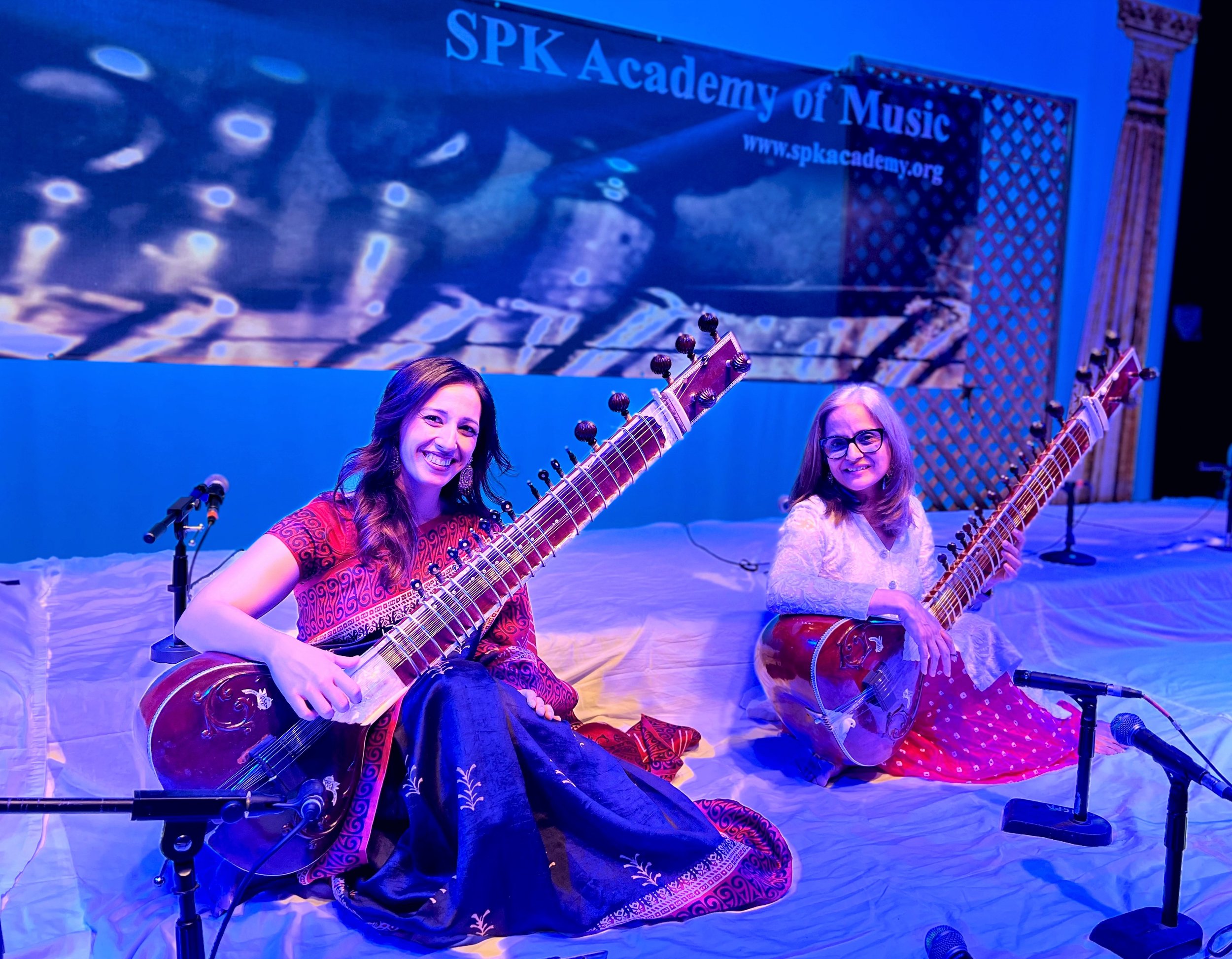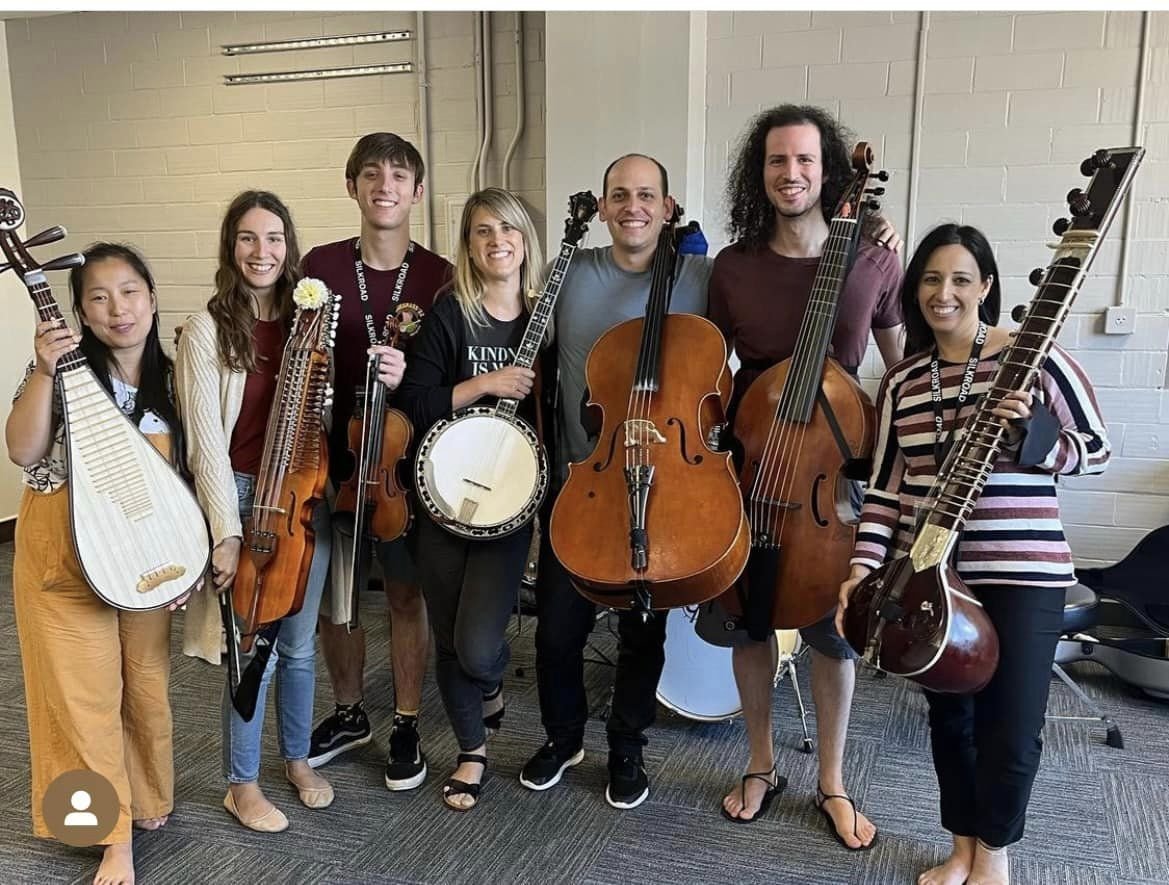Spotlight on Seema Gulati, Sitarist and Director of the SPK Academy of Music
We all know Seema Gulati to be our SPK Academy of Music Superwoman, gracefully and selflessly balancing her many roles - as a senior disciple of Ustadji, a performer, the director of the Academy, and mentor, teacher, and friend to so many students.
SPK Academy student Alpa Shah sat down to find out more about Seema’s story - how her musical journey began, the early days of SPK Academy, and her hopes and dreams for the future.
Part 1: How it started..
When did you start to learn music?
I was always drawn to music as a child. I loved Bollywood songs, and my dream voice was Lataji (the late Lata Mangeshkar)—I would listen to her songs all day, sing along, and dream of being her. But while I was exposed to music from a young age, I only started structured training when I was 15-16, first in Western classical singing, through the Royal Conservatory of Music, and then in Indian Classical Music from the Pakistani composer Sohail Rana. I also started some training in the Indian Classical dance of Kathak.
Seema Gulati, sitar performing in New York for Chhandayaan
Why did you choose sitar as the instrument of choice?
It happened gradually over time. I was exposed to some sitar music growing up—the first sitar players I saw perform were Pandit Debu Chaudhury and Ustad Nishat Khan. I remember thinking, ‘Just look at his facial expressions, he's having so much fun… I want to feel like that.’
It was only when I was learning Kathak in 1999, while studying at university, that my teacher, Vrinda Bhagwat, recommended that I attend one of Ustadji’s concerts. All I remember is being very drawn to the music and the performance, and finding it mind-boggling that one instrument could make all these sounds.
There was a workshop a few days after the event, and I thought I would try it out. Hilariously (although not at the time) I never made it to the workshop (I got lost on the way there!), but I started learning the basics from Ustadji’s senior student at the time, and that’s when it all began. I was fortunate to meet Ustadji again on a return visit to Toronto. I didn’t know where it would take me, but I knew that I wanted to keep playing.
What kept you motivated during those early days?
I was blessed with a certain discipline to practice. If I was told to practice sargam, I did. I knew I wanted to pursue music in some way, and so I just did it, without expectation. I knew I had started a journey, but I didn't know what the journey was.
What drew you to Ustadji?
Initially, I don’t think he recognized how determined I was, and my stubborn personality meant that I took this as a challenge. I think Ustadji was surprised to see that I was still in riyaaz each time he came back to Canada.
In 2003, I followed his concert tour, accompanying him as much as I could on tanpura, and this helped me to connect to the music and to Ustadji as an artist.
Immersing myself in the music in this way started to change the way I connected to it – I still didn’t understand it all that well, but I started to feel it, how certain notes and phrases would affect me.
That’s when I knew I wanted to continue learning Ustadji’s music. Over the next couple of years, I started to learn more frequently from him, and in 2005 I made the decision to ask him if I could become his shagird.
What did you play at your Shagirdi ceremony?
I played Raag Bihag in Teental. It was a very special composition that he had performed at the Saptak Festival, and I had heard it on his CD. (You can listen to Ustadji’s recording here).
Part 2: The birth and evolution of SPK Academy
When was SPK Academy established?
We officially established SPK Academy in 2012. It all came about very organically. During Ustadji’s concert tours, we would often receive inquiries about whether he was willing to teach, and would spontaneously organize workshops. I still recall the first workshop being held in Albany in 2006.
Upon Ustadji’s return to India students often felt lost and without direction, and that’s when he asked me to help guide them in his absence. Gradually our student numbers multiplied, by word of mouth largely. Still, these sessions were largely unstructured and spontaneous until the SPK Academy of Music’s establishment in 2012.
Over the last 10 years, more and more students have come to the academy, and we now have over 100 students. Looking back, the organic way in which it came about reflects the beauty of the process. No one was planning that I would teach or become his senior disciple. It all just gradually happened.
A number of students have also mentioned that my Western upbringing and my knowledge of Western music has helped to build a bridge between the East and West and allowed students from Western cultures to feel comfortable learning at the Academy. It brings me great happiness to know that I have been instrumental (pun intended!) in enabling access to Ustadji for a wider group of aspiring students.
How is teaching conducted at SPK Academy?
We honor the traditional way of learning, the guru-shishya parampara, and through 3-4 day shibirs or retreats, students are able to live at the academy with Ustadji and their fellow students. We host at least two shibirs a year, one on the East Coast and the West Coast. This quality time and proximity to Ustadji allows students to develop a personal connection with their guru, and to nurture and build deep life-long relationships among the student community.
We also offer one-to-one classes with Ustadji, both online and in-person, to allow students to have individual attention. And not only do we offer tutelage at the academy’s headquarters in Phoenix, but also at locations all over North America. We have held workshops in Boston, New York, Virginia, San Francisco, Pittsburgh, Ottawa, Toronto, and countless other cities.
The teaching continues all year-round. When Ustadji is in North America, we are constantly immersed in his music. When he is in India, I fill that gap for SPK Academy students - I think of myself as his mail-woman, delivering his teaching, to ensure that his absence isn’t felt so drastically. He is in touch each day, composing taans and singing them to me on the phone. This way I’m always connected to his latest soch (or “manner of thinking”) and can pass that on to the students. It’s as close as we can get to the traditional way of teaching.
How has the academy evolved since it first started?
Our most recent achievement is that in November 2021, we obtained the status of a US non-profit organization, which will enable us to pursue a new set of charitable goals. The aim is to help the under-privileged, through grants and charitable donations, to those who cannot afford to reach and learn from maestros of Ustadji’s caliber, both in India and worldwide.
We receive so many videos and messages each year from people who want to learn from Ustadji, and to me, it is such a loss that they are not able to learn due to their economic circumstances. I am personally very passionate about this - my goal has always been to make Ustadji more accessible, to allow everyone to experience his teaching, and this phase of the academy’s work allows me to pursue that goal in a new way.
This year, we managed to hold a workshop in Kolkata during which new students were able to learn from Ustadji essentially for free (Kolkata Workshop - March 2022) and to sponsor a number of students from India to learn virtually from Ustadji at subsidized rates.
What do you enjoy the most about SPK Academy?
When we set up the academy, my main objective was for more students to have access to Ustadji and to his teaching. And I am happy to have played a pivotal role in achieving that. Seeing people learning and progressing brings me such joy, and I know it brings Ustadji joy too.
Nowadays, I am enjoying seeing all the students improving in their technical ability, as well as in their ability to perform. Our mission statement is to make people musicians or performers in their own right. Ustadji believes that each of us has the ability to perform. We are gradually instilling this belief in our students, through student performances, raag challenges, and other activities that we are nurturing at the academy. I am enjoying seeing our students emerge as performers, with their own musical personalities.
A unique aspect of Ustadji’s teaching is that he teaches us the same compositions and patterns that he performs in concert, adapted to a particular student’s ability. In doing so he helps us to believe that we can perform ourselves, and listening to him perform compositions that he has taught us is simply magical and reminds us how much we want to play.
Part 3: A performer’s journey
What are your goals as a performer?
Honestly, I didn’t know I wanted to be a performer when I started. Now it is much more clear to me that this is my vision. I also see how Ustadji is grooming me and paving the way for me to perform. He has introduced me to the music, allowed me to understand it, and has instilled a desire in me to want to perform, and a belief that I am able to perform.
Your guru is always able to see your potential, to tell you where you can go and what you are capable of doing. It is Ustadji’s music and compassion that are pushing me forward on this path, and bringing out what I am capable of as a performer - I feel like there’s no stopping now, I just want to keep going and working for it.
My dreams as a performer are simply to play and represent my ustad, for people to hear me play and see his music through me. My love, passion, respect for the music and for him - that’s what I want to come out when I'm playing. And when I perform, I want to get to the state where I forget I'm performing, and just be one with whatever I am playing. That is the most important thing, to be on stage and enjoy yourself.
And you are already well on your way! Where have you been performing lately?
This year, there have been a number of special performances. In June, I played at the Indian Consulate in New York, together with a Western violinist - this was the first time in which I had collaborated with a western musician. I also was honored to perform solo at a concert hosted by Chhandayan, a highly reputable organization in New York city. Ustadji was able to attend this concert, which made it extra special.
In July, I performed at our annual Guru Purnima celebrations, held this year in Phoenix, and in August, I performed at the Silk Road Global Musicians workshop, which took place at the New England Conservatory in Boston. This was an exciting yet humbling experience, collaborating with so many musicians from around the world.
Seema with her Silkroad Practice Group
Seema with her performing group at Silkroad Global Workshop
Seema Performs at East Meets West
Most recently, I recorded an interview and short performance piece for the Musical Instrument Museum (MIM) in Phoenix as a part of their “Treasures of the Past” series. It will be showcased as part of their display of instruments from the subcontinent as well as in their monthly newsletter to all MIM members.
How do you separate yourself as the student, from the instructor, from the director to being a performer in your own right?
It’s not easy - I try to separate these roles to some degree and am constantly working on this, as well as devoting more space to developing myself as a performer. Being the director of SPK Academy is a full-time job in itself. It might compromise my development as a performer to some degree, but it is also a huge blessing to be constantly connected to Ustadji and the music. I am living and breathing music, and I am constantly inspired and motivated to be a better person and musician as a result.
What is your message for other aspiring female musicians and music students?
I think it is important not to feel that there are any restrictions. I have drawn inspiration from seeing other female musicians—Kaushiki Chakraborthy, Anoushka Shankar, Anupama Bhagwat, Roopa Panesar—all showing that it is possible to be a professional musician in their own right without compromising on their family life. If you have the desire, dedication, and the right guru, it is possible.
And even for those who don’t make it a career, it is still possible to find balance and support each other to reach whatever goals we have from learning music. The female students of SPK Academy, who are of all ages, occupations, and backgrounds, are a constant source of inspiration for me.
What are the main lessons you have learned as you have grown as a performer?
When we hear Ustadji perform, we hear perfection. And for many of us, in our minds, that’s what a performer needs to be. I have come to a realization that when we play Ustadji’s music, we play it with our own voice and that deserves to be heard. And not only must we play it, but we have to feel it. Otherwise, you are not representing the music, you're just reciting his words. You have to understand this concept when performing.
What has music taught you about life?
Music is life's biggest blessing. Nothing else gets you closer to fully understanding yourself. Ustadji always says whatever you are feeling, that is what your music is expressing. If I am feeling joy, my music is joyous. Playing is almost like sitting in front of a mirror—it has helped me become better acquainted with myself, who I am, what I want from life, and my aspirations. It has made me the person I am today. In life, we have to find our voice, and music helps us find our voice.
What is your favorite raag?
All of them are beautiful. Whatever I hear Ustadji play I fall in love with, but Raag Yaman is an all-time favorite.
Who are your musical inspirations?
Ustadji. Aside from him, all of my knowledge of music is driven by Ustadji. We have huge respect and admiration for the music of Ustad Vilayat Khan, Ustad Bade Ghulam Ali Khan, and Ustad Amir Khan, and for what they have been able to inspire Ustadji to do. I am also personally very fond of Ustad Amjad Ali Khan’s music.
What is your message to SPK Academy students?
To SPK students, actually all students of music - do it! Embrace the music and do it! That is the hardest part of being a musician, believing in the music, in the journey, in your guru/Ustad. It’s not as easy as going and getting a degree, finding a job, and starting a 9 to 5. It’s something you have to surrender yourself to and immerse yourself in. It’s easy to say but to actually do, it’s so difficult. It’s so easy to get swayed, discouraged, and demotivated. But don't - if you're doing it because you love it, keep doing it. Follow your heart and your heart will lead you in the right direction.
Interview conducted and written up by Alpa Shah, SPK Academy Student







